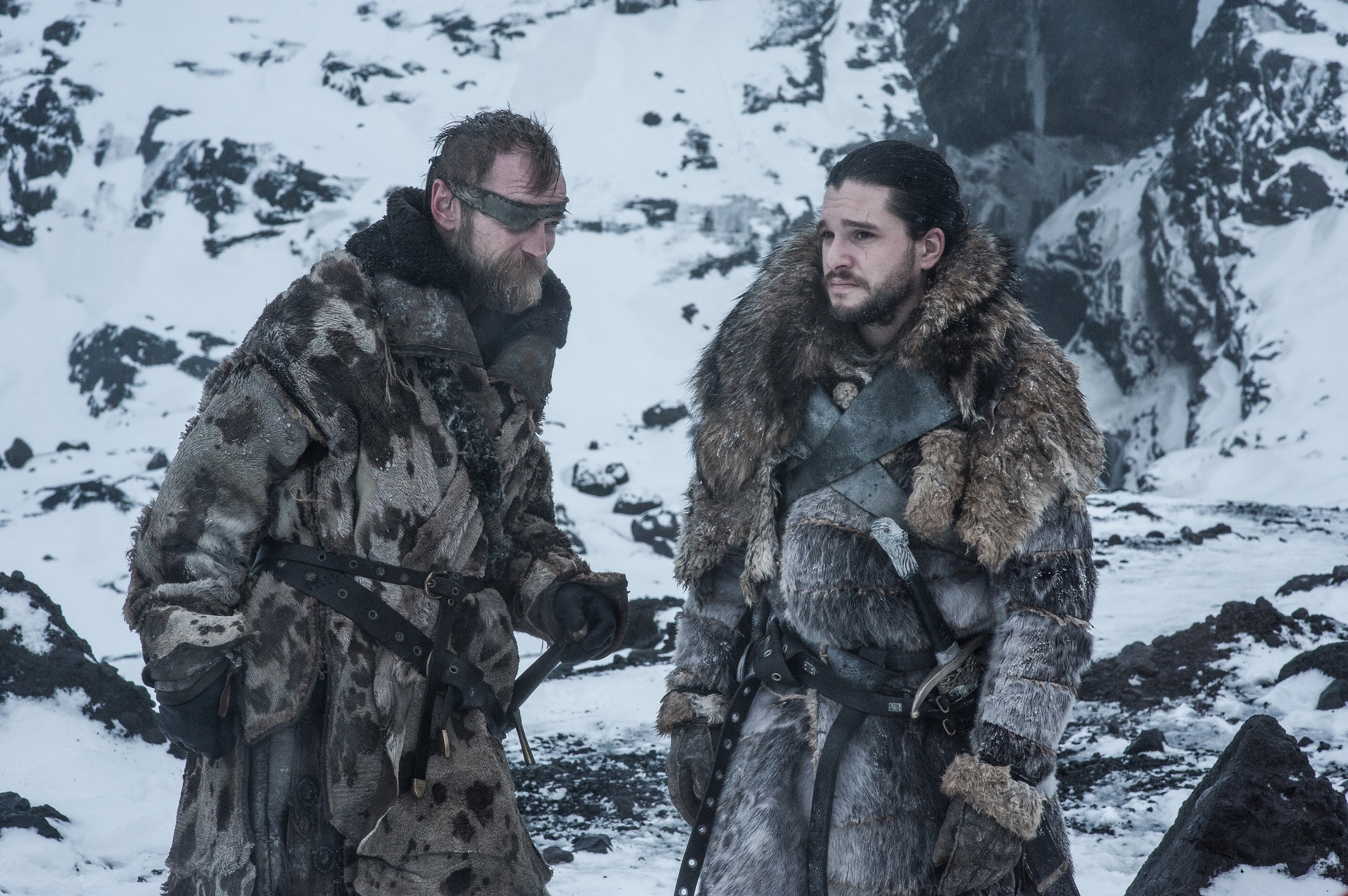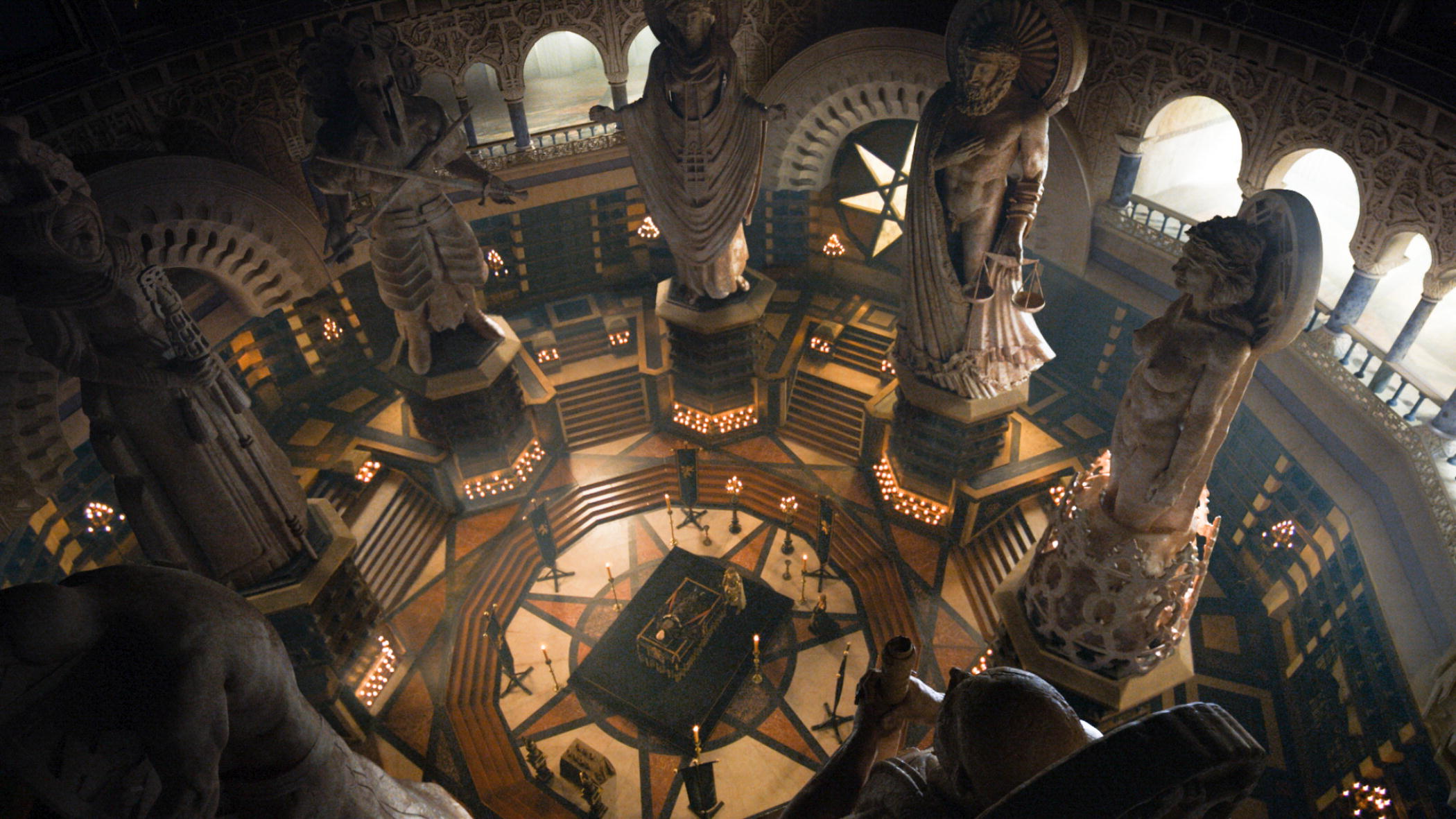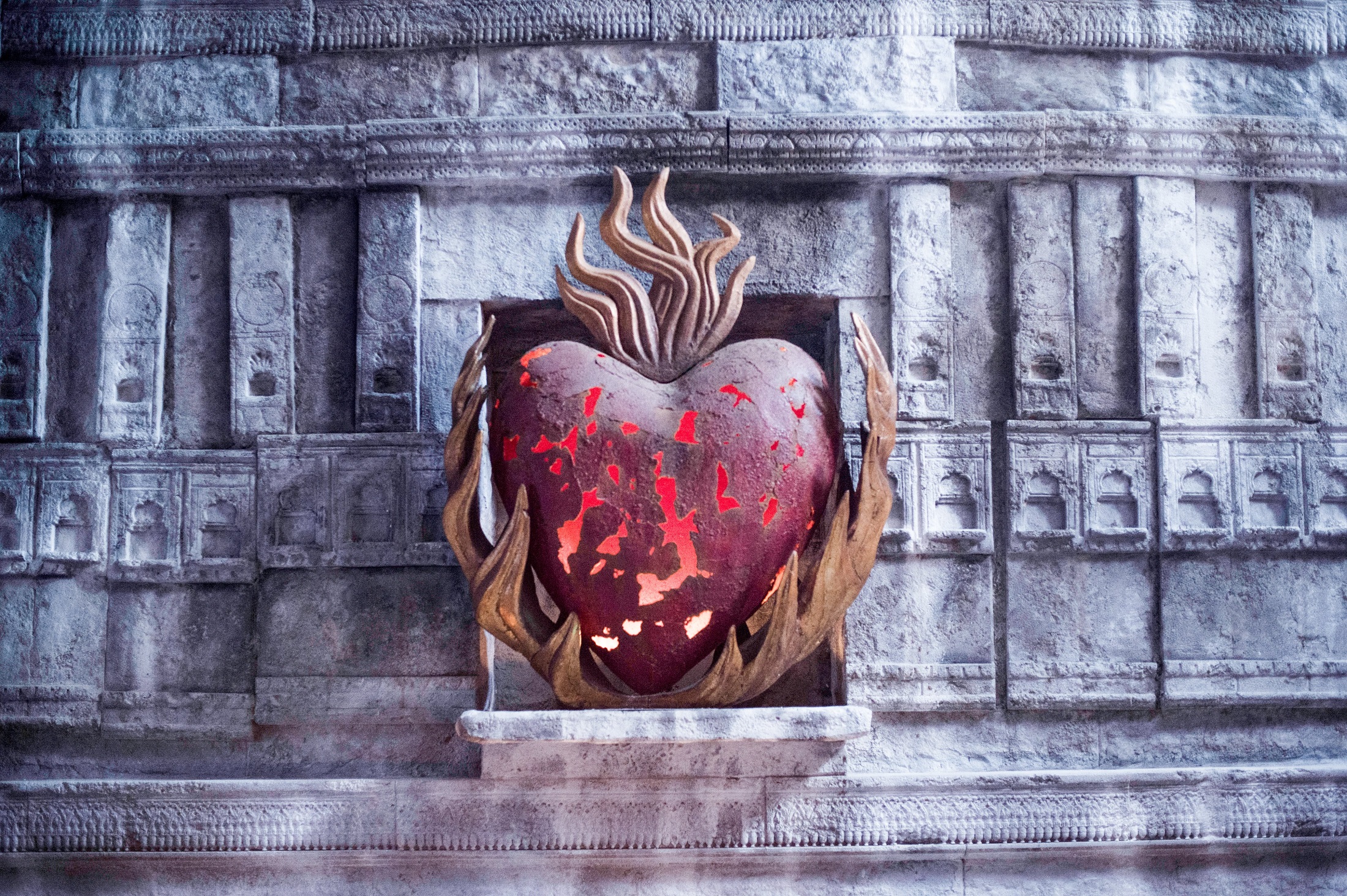“The Lord of Light never spoke to me. I don’t know anything about him, I don’t know what he wants from me.”
“He wants you alive.”
“Why?”
“I don’t know.”
Faith. The singular syllable composing the verbiage belies a misleading sense of simplicity and ease. It is perhaps in part due to that seeming simplicity that the true power of faith can sometimes be forgotten and buried beneath everything else. Power can sometimes be lost to the understandable tendency to tie faith specifically into a religious paradigm. While that may be the most ostensibly obvious connection to make, that is not necessary always the case. Even in conversations that are imbued with a key religious theme, such as the quick one between Beric Dondarrion (Richard Dormer) and Jon Snow (Kit Harington), other forms of faith are just as critical to what the writing is aiming to convey.
In the world of Game Of Thrones, as much as in the real world, characters have faith in a god, multiple gods, or no gods at all. Some believe in the worship of money, a practice Tycho Nestoris (Mark Gatiss) would be especially proud of. Others believe in the worship of their own abilities for the gods have seemingly forsaken them entirely. Others decry in the worship of anything at all for the night is dark and full of nothing. Still others worship for a purpose, without necessarily believing in anything at all.
In the Faith of the Seven, there is a singular deity who has seven faces but to many there are seven different gods, a distinction of class that notably harkens back to ancient pagan religions. Some may worship the Father, who protects his children and is the harbinger of justice. Others worship the Mother, who brings with her mercy and safety for the family. Soldiers marching off to fight in an aristocratic war often pray to the Warrior for strength, victory, and the hope of returning home. People lay blessings at the feet of the Maiden to keep young women safe under her caring eyes. The Crone garners prayers from those who seek to fill their minds with wisdom.
The Stranger is perhaps the most interesting facet of the Seven. They are the outcast, the cripple, the bastard, the broken thing to whom all those who are treated by societies as fitting within those narrow paradigms worship in the hope of finding some solace and companionship. The Stranger is often referred to as the God of Death and fittingly they are a prominent visual member of the House of Black and White. The Stranger behaves like the Ancient Egyptian god Anubis, who would lead souls into the afterlife after weighing their heart against a feather to see if they had led a worthy life.
The Old Gods are the most prevalent in the North, their visages etched into weirwood trees throughout the region. They have no names, but they are the gods who represent elements of the world and nature such as water, wind, and forests. Their origins had been with the Children of the Forest but the religion persisted in spite of the Andal invasion. As the Faith of the Seven itself became more influential in the South, the old gods remained heavily influential in the North and indeed their weirwood trees, for example, continued to be a prime symbol of traditional ceremonies and artifacts.
The Lord of Light is believed, as his name implies, to be the harbinger of fire, and fire brings warmth, joy, and life. The Lord of Light, also known as R’hllor or the Red God, is locked in an eternal struggle against the Great Other, a god who serves as the power of coldness, despair, and death. That is the eternal struggle that defines the religion so fastidiously followed by Melisandre (Carice van Houten), Kinvara (Ania Bukstein), and the Brotherhood Without Banners. That is the eternal struggle Melisandre often sees in the flame, the struggle that can only be brought to an end by Azor Ahai.
When Jon first gasped for breath after his death, he was terrified, afraid, and simply unable to understand the circumstances he found himself within. As it went, how could he possibly comprehend where he found himself? One minute he was in the courtyard of Castle Black, being stabbed by his own men of the Night’s Watch for allowing the wildlings passage. He had bled out amidst the snow and ice and was consumed by darkness and then nothing at all. The next minute he found himself gasping loudly for breath on a stone slab, with a strategically placed cloth and Melisandre standing right near him.
Melisandre was stunned. She had begun to lose her faith in the Lord of Light after Stannis (Stephen Dillane) had failed to fulfill the prophecy and become Azor Ahai. Seeing Jon come back to life through her prayers to the Lord of Light sparked that faith within her once more but she also had to know. Did the Lord of Light speak to Jon? Did he appear to him, perhaps? What and whom did Jon see in the afterlife? Her smile faltered when Jon noted that he hadn’t seen anything in the afterlife. Nothing. He had been surrounded by nothingness.
When Jon came back to life, he was crushed. He was crushed by the weight of the betrayal he had suffered by those who had sworn to serve under his leadership, the ones whom he had considered to be his friends. He was crushed by the pain that had engulfed him as he bled out amid the frigid winds. He was crushed by the weight of trying to even remotely understand what had happened to him. Jon felt angry, defeated, but perhaps most importantly, he felt lost.
The Old Gods may have been worshipped in Winterfell and Castle Black, but Jon had always been driven more by his faith in honor. He had been raised by a man for whom honor, justice, and love were the pillars upon which the foundation of a righteous life and society could be built. Jon embraced Eddard’s (Sean Bean) teachings as his core system of belief. He embraced them to the degree that they cost him more than he could ever have anticipated: his family, his love, his life.
When he sentenced his betrayers to death, there was no note of triumph in his tired voice. There was an exhaustion, a weariness that was imbued with grief and regret. Jon had come back to life, but for what purpose? Everything he had held dear had been tied intricately to his faith in honor and that faith had been rewarded with nothing but repeated stabs in the chest. If the path of honor had killed him, what other pathway could there possibly be? For in death, there had been nothing, and after death there had simply been a nothingness of a different sort. No one was truly able to understand what that meant, and Jon was driven into a deeper, darker space of isolation.
Beric is the first man Jon meets who has an understanding of what he has gone through, an understandable rarity as R’hllor does not bring people back from the dead with a high degree of frequency. Beric notes that his worship of the deity of fire is not a worship of a deity for the sake of it or indeed for any sort of personal gain. He has no idea as to why the Lord of Light wanted Jon alive. He has no idea what the Lord of Light has planned for him. He has no idea what the Lord of Light truly wants.
Jon notes sharply that no had ever been able to tell him what the Lord of Light or indeed any other god wanted. He could thusly never bring himself to believe and serve in a god whose desires he did not even know, let alone understand. He serves the North because he knows what his people want and how he can fulfill the responsibilities he holds towards them.
Beric takes no offense to Jon, noting sordidly that he indeed thought about the same query all the time. He simply had arrived at a conclusion that it ultimately didn’t matter if he understood what the Lord of Light wants from him. He knows that his worship of the Lord of Light is a pathway for him to fight, not in order to put some random person on a throne made of swords, but instead fight for life. Death is going to win as it always does, but life is worth fighting for.
When Jon was almost trampled to death in the Battle of the Bastards, he struggled to push his way towards the sky and breathe. When he was almost dying amid those thousands of boots, he felt the will and the need to breathe again. But breathing is not living. Beric’s desire to fight for the living resonates heavily with Jon, who struggled so much to find a purpose in his new lease on life and found it within fighting against the greatest threat the people he loved and Westeros had ever faced.
George R. R. Martin has repeatedly noted that he lacks an interest in providing a definitive answer of any sort in regards to which god or gods are the “right” ones. The vessel of the faith in the books and the show is arguably the less important factor, if not indeed an outright negligible one. What is more important is how that faith motivates and empowers individuals to make critical decisions and drive their narratives forward. For Beric and Jon, the power of their faith drives both of them to fight on behalf of the living. It just so happens that the vessels of that faith are starkly different and therein lies a simple yet tragic understanding of faith and its equivalent power to bring us together and tear us apart.
Valar Dohaeris,
Akash Of the Andals
The post The Writing On the Wall: The Fires Of Faith appeared first on Watchers on the Wall.
Via http://watchersonthewall.com



![20160421_ep602_Publicity_still_32_00161588[1]](http://watchersonthewall.com/wp-content/uploads/2016/05/20160421_ep602_Publicity_still_32_001615881.jpg)

No comments:
Post a Comment